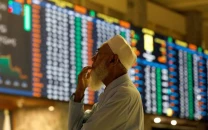South Asia study: India takes lead in restrictive trade measures
USAID asks Pakistan to enhance sensitive list to protect industry, agriculture.

USAID asks Pakistan to enhance sensitive list to protect industry, agriculture. DESIGN: MUHAMMAD SUHAIB
India stands on top among South Asian countries in restricting free trade with neighbours with the help of tariff barriers, based on criteria set by the World Bank, reveals a study conducted with the assistance of the United States Agency for International Development (USAID).
The study, conducted by renowned economist Hafeez Pasha in cooperation with USAID, focused on the prospects of free trade between Pakistan and India after grant of most-favoured nation (MFN) status to Delhi.
The report suggests that Pakistan should enhance its sensitive list of items to protect the industry and agriculture after giving MFN status to India.
The study proves right the concerns of Senator Sughra Imam, the Ministry of Industries, Ministry of Textile Industry and farmer lobbies. Though they are in favour of trade with India, they oppose a sudden phasing out of negative trade list, which they fear will provide Delhi an open field to swallow Pakistan’s fledgling industry.
They call for gradual removal of the negative list and on the need of a comparative study before granting MFN status.
However, exporter lobbies are pushing the commerce ministry to open trade with low duties. The Foreign Office has also called for granting MFN status to Delhi as part of confidence-building measures between the two countries.
It is interesting to note that the commerce ministry had finalised the sensitive and negative lists and was ready to grant MFN status to India by the end of December 2012. However, concerns expressed by the stakeholders forced the government to delay the move and now it is expected to make an announcement by February 15.
“According to criteria set by the World Bank, India is on top in this region in protecting the local industry by imposing tariff barriers, which discourage free trade with neighbouring countries,” a source says quoting the report.
Pasha was scheduled to give a presentation on the report to the stakeholders on January 3, but it did not happen. According to sources, now presentation will be given on Tuesday in the presence of USAID officials.
Sources point out that the report does support trade with India and not oppose the MFN status, but it suggests that Pakistan should expand the sensitive list to protect the domestic industry and agriculture.
It says India is giving higher subsidies to the agricultural sector, which can hurt farmers of Pakistan. This concern is also raised by the farmer lobbies, who argue that higher Indian subsidies will destroy Pakistan’s agricultural economy, leading to food crisis.

The prime minister’s secretariat had also expressed reservations about the list of agricultural items that would be imported from India through the land route.
It asked the commerce ministry whether a study was conducted on the economic impact of agricultural products’ import from India and whether other countries that share borders with India have had similar experiences.
In response, the ministry only said it consulted fertiliser manufacturers for assessing the impact of agricultural goods’ trade with India.
On its part, the Ministry of Industries had proposed a gradual phasing out of the negative list over a period of five years. It also called for linking the opening of trade with reciprocal measures by India to ease non-tariff barriers that stand in the way of Pakistan’s exports.
The Ministry of Textile Industry, while fearing that Indian goods would swallow Pakistan’s textile sector, argued that India and Bangladesh had realised the importance of textile in economic development, export growth and job creation and as a result they were protecting their industry.
It pointed out that Pakistan exported only $45 million worth of textile products to India in 2010, whereas India shipped $566 million worth of goods to Pakistan, though the negative list was still in force.
It said almost all textile items of Pakistan that had export potential had been placed in India’s sensitive list. Delhi has also kept high non-ad valorem duties on most textile products (around 700 tariff lines), which constitutes a hurdle in the way of exports.
Published in The Express Tribune, January 6th, 2013.
Like Business on Facebook to stay informed and join in the conversation.



















COMMENTS
Comments are moderated and generally will be posted if they are on-topic and not abusive.
For more information, please see our Comments FAQ